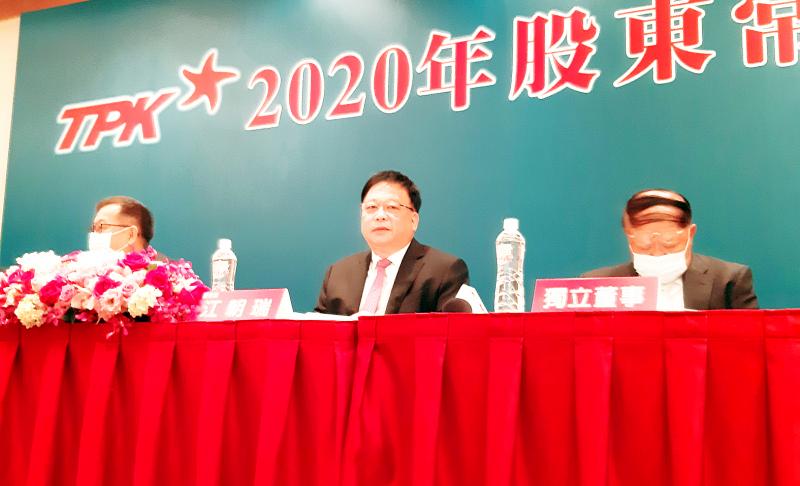Touch module and sensor supplier TPK Holding Co (宸鴻) yesterday gave a lukewarm outlook for the second half of this year, as the COVID-19 pandemic has upended the industry’s seasonal patterns.
Amid pandemic-related transportation restrictions and social distancing, online learning and remote working fueled demand for notebook computers and tablets in the first half, TPK chairman Michael Chiang (江朝瑞) told reporters after an annual shareholders’ meeting in Taipei.
“This was a big surprise for us, as we thought demand would have dipped [in the first half],” Chiang said. “I think there will be no explosive [revenue] growth in the second half, but a mild one.”

Photo: CNA
The company also saw robust demand for silver nanowire touch modules for 85-inch electronic whiteboards from schools, Chiang said, adding that TPK expects shipments of silver-nanowire touch modules used in large electronic whiteboards to grow 30 percent annually this year.
Like most of its peers, TPK usually sees revenue increase significantly in the second half of the year compared with the first half, as customers start restocking inventories ahead of annual product launches and year-end shopping sprees.
Over the past five years, TPK reported at least 30 percent more revenue in the July-to-December period than in the first six months of the year, company data showed.
“The second half of this year will be relatively flat,” Chiang said.
Average selling prices would continue to spiral down, Chiang said, adding that the company has tried to save costs to keep its business afloat
The company’s board of directors did not propose the distribution of a cash dividend, as it only eked out a profit of NT$209 million (US$7.03 million), or NT$0.51 a share, last year.
TPK had a gross margin of 3.5 percent and an operating margin of only 0.1 percent last year.
To improve its profitability, TPK yesterday said that it is diversifying from its core touch sensor and module business, and is looking for higher-margin businesses.
For the first time, TPK is attempting to build local manufacturing capacity in Taoyuan’s Gueishan District (龜山) to make insoles for athletic footwear and protective gear for sports using 3D printing technology, Chiang said.
The company is also working on two new projects with customers in the information technology sector, he said, without disclosing the names of its two partners.

TAKING STOCK: A Taiwanese cookware firm in Vietnam urged customers to assess inventory or place orders early so shipments can reach the US while tariffs are paused Taiwanese businesses in Vietnam are exploring alternatives after the White House imposed a 46 percent import duty on Vietnamese goods, following US President Donald Trump’s announcement of “reciprocal” tariffs on the US’ trading partners. Lo Shih-liang (羅世良), chairman of Brico Industry Co (裕茂工業), a Taiwanese company that manufactures cast iron cookware and stove components in Vietnam, said that more than 40 percent of his business was tied to the US market, describing the constant US policy shifts as an emotional roller coaster. “I work during the day and stay up all night watching the news. I’ve been following US news until 3am

Six years ago, LVMH’s billionaire CEO Bernard Arnault and US President Donald Trump cut the blue ribbon on a factory in rural Texas that would make designer handbags for Louis Vuitton, one of the world’s best-known luxury brands. However, since the high-profile opening, the factory has faced a host of problems limiting production, 11 former Louis Vuitton employees said. The site has consistently ranked among the worst-performing for Louis Vuitton globally, “significantly” underperforming other facilities, said three former Louis Vuitton workers and a senior industry source, who cited internal rankings shared with staff. The plant’s problems — which have not

UNCERTAINTY: Innolux activated a stringent supply chain management mechanism, as it did during the COVID-19 pandemic, to ensure optimal inventory levels for customers Flat-panel display makers AUO Corp (友達) and Innolux Corp (群創) yesterday said that about 12 to 20 percent of their display business is at risk of potential US tariffs and that they would relocate production or shipment destinations to mitigate the levies’ effects. US tariffs would have a direct impact of US$200 million on AUO’s revenue, company chairman Paul Peng (彭雙浪) told reporters on the sidelines of the Touch Taiwan trade show in Taipei yesterday. That would make up about 12 percent of the company’s overall revenue. To cope with the tariff uncertainty, AUO plans to allocate its production to manufacturing facilities in

TARIFF CONCERNS: The chipmaker cited global uncertainty from US tariffs and a weakening economic outlook, but said its Singapore expansion remains on track Vanguard International Semiconductor Corp (世界先進), a foundry service provider specializing in producing power management and display driver chips, yesterday withdrew its full-year revenue projection of moderate growth for this year, as escalating US tariff tensions raised uncertainty and concern about a potential economic recession. The Hsinchu-based chipmaker in February said revenues this year would grow mildly from last year based on improving supply chain inventory levels and market demand. At the time, it also anticipated gradual quarter revenue growth. However, the US’ sweeping tariff policy has upended the industry’s supply chains and weakened economic prospects for the world economy, it said. “Now